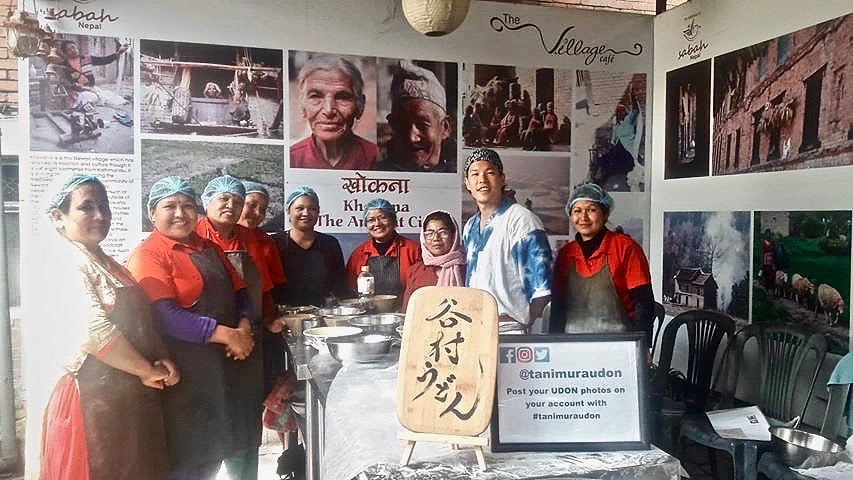Money creates convenience, convenience reduces communication opportunities お金は生活を便利にし、便利さはコミュニケーションを削ぐ






Udon challenge 115/1200
#nepal #kathmandu
Workshop for female staff in Village Cafe at Kathmandu Nepal. Women in Nepali villages have traditional Nepali culinary cooking skills, but there weren’t many places to perform their talents. What Village Cafe does is to offer them places, and therefore more women could contribute to society with their unique abilitites. Dal baht and some other few dishes seems like the only traditional Nepali plates, but in this country with more than 100 minorities coexisting, there are lots of more traditional dishes hidden that are only served during some celebration seasons. In Village cafe’s menus, these kinds of hidden plates are on the list. I can’t wait to see how my udon workshop would give these ladies inspiration, and add some new breeze to the menu.
ネパール・カトマンズにあるvillage cafeさんで働く女性スタッフの方々にうどんワークショップをさせて頂きました!village cafeさんでは村の女性が持つネパール固有の料理のスキルを活かすためにカフェという場を与え、村の女性の社会進出を促す活動をされています。ネパールにいると、多くの人が日々食べているのはダルバートです。でも実は100以上の民族が共存しているネパールでは、チベット系、インド系、中国系の料理や、祭典のみに出てくる伝統料理等、数多くの料理があります。village cafeさんではそのような料理がメニューに並びます。そこで今回のWSを経て、スタッフの方々のスキルにより、今後うどんが彼女達にどのようなインスピレーションを与えていくのか楽しみです。


Money creates convenience, convenience reduces communication opportunities
Traveling could become much easier with money. When I visited a village in Nepali last time, I asked around but there was no bus to get to a village. Walking towards the direction of a village, I found one motorbike towards going to same direction and this guy took me to the place for free (Actually I asked him if 100rupees is okay but he said “no…it’s either 300 rupees or free”, which was very philosophical and made me think a bit…
This story probably couldn’t have existed if there was a plenty of money in my pocket to take a taxi. It could have been so much easier without walking on roads with sand dust and heavy luggage.If I’ve taken a taxi, this Nepali guy’s kindness was never felt and I could have lost a chance to think through this philosophical question.
From this kind of experience, I learn how money makes my life easier, but easy life could also mean reducing communication opportunities with people.
In some islands of Japan, youths long to go to Tokyo because urban life is more convenient compared to island life. But once they start their lives in Tokyo, some suffer from loneliness because rooms are clearly private and separate. There is not so much interaction with neighbors.
On the buildings in Kathmandu, I saw many boards that says “Learn Japanese and go to Japan!”. I assume it is telling that if you go to Japan, you get better pay and more convenient life than you do in Nepal. Other countries that were often mentioned were Australia, U.K, and Dubai.
I doubt whether their visit to Japan would really make Nepali people’s lives better. It’s great to manage their minimum medical expenses and living cost with money from Japan. But if they start to yearn for more convenient life, moving from village to city, life would be a full of entertainment and fun, but they would lose communication with family. It’s just one scenario. It could not happen. But what I am saying here is that it could happen too.
お金は生活を便利にし、便利さはコミュニケーションを削ぐ
旅は、お金があるとイージーゲームである。例えば前回ネパールの村を訪れた時は、バスがあるかを聞きまわった結果、なかった。なかったので、行きたい方向に向かって歩きながら、後ろから来るトラックやらバイクやらに声を掛けまくったところ、無料でいいぜ!という気前の良いネパール兄ちゃんがバイクの後ろに乗せてくれた。(本当は、100ルピーでどや?というと、300ルピーか無料どちらか選べ、という哲学的問いを受けて、なんとセクシーな問いかけなんだ、と感動した)
お金があれば、きっとタクシーに乗って終わりだろう。この上なく便利である。砂埃の舞うネパールの道路を、重い荷物を背負いながら歩かなくていい。
一方で、仮にタクシーに乗っていたら、ネパール兄ちゃんの優しさに触れることも、哲学的問いを受けることもなかったのだろう。ヒューマンドラマなき旅に、面白みはない。そう思うと、お金が生み出せる数ある中での一つの効用は、便利さを生み出すこと。そして、便利さは人とのコミュニケーション機会を削ぎ落とす。
日本の離島に住む若者が、東京に憧れる。東京に行ってみたら、超絶便利な世界。だけど、都会のアパート生活は、それぞれの明確なプライベート空間を持ち、人との関わりはなく、孤独である、という話はよく聞く話である。
ネパールでは、日本に行こう!という謳い文句の看板をよく見る。つまり、日本に出稼ぎに行けば、日本での稼ぎはネパールより良いので、ネパールの家族もより良い生活ができる!ということなのだろう(と推測する)。他にもオーストラリア、イギリス、ドバイなどは出稼ぎ先としてネパールではよく挙がる。
上記のような事象から、勝手に想像するに、日本に行ったネパール人の今後の生活はより良いものになるのだろうか?と懐疑的である。日本から持ち帰った金で、確かに最低生活ラインに必要な医療費、生活費を捻出するのは良いと思う。ただそれ以上の便利な生活を求めれば、村の人たちは都会に出て、刺激的な生活を送る一方、家族のコミュニケーションの場は減るだろう。勿論、これは数あるシナリオのうちの一つに過ぎない。そうならない可能性もある。それでも、そういう結末もあると感じる、ということである。
Do it the same way if you want to be friend 仲良くなるためには、相手と同じことをする






Udon challenge 105/1200
#nepal #nagarkot
One of the Nepali family members in a village, who I stayed with the other night, turned out to be a teacher in a school, so I just did a surprise visit to a school next day to make udon. Even though udon is similar to Tibetan & Nepali noodle dish “thumpa”, I really appreciate Nepali kids and teachers for trying something new from Japan. Huge thanks to the school managers to welcome total sudden chef visit from Japan.
泊めさせて頂いた村のネパールご一家の一名が、近くで学校の先生をやっているとのことで、突撃訪問して無料でうどんを作ってきました!チベット文化圏によくあり、ネパールにもある麺料理「トゥクパ」の日本バージョンです!と言いつつも、「うどん」という得体の知れない食べ物に挑戦してくれた先生と子供達に感謝!うどん作らせてくれい!と何ともぶっきらぼうなゲリラスタイルでしたが、快く受け入れてくれた学校関係者の方々にも大感謝です。


As world traveling udon maker, I served my udon and sometimes stayed some days together with people of all ages and sexes with diverse ethnicities and background. In Israel, I stayed with Jewish family for a month. In Australia, I’ve made udon for a party of 80 years old crowd. In Nepal, I made udon for school kids under 10 years old in a village. These things all start with “stepping into other people’s private space” This is actually the biggest difficulty as world traveling udon maker.
It suddenly starts so dry when this is talked as technical matter, but the best way to create good relationships with people from different part of the world is to “do thing in same way” as others are doing. If kids are jumping, there is no reason for you not to jump together, if kids are dancing, no reason not to dance together. Foreigners should slurp udon with nice big sound in Japan, and eat curry by hands in India. Otherwise foreigners remain tourists forever, and never be their brothers.
Surprisingly, in a country that I don’t understand their language, when I imitate whatever local has said (I have no idea what they have said), people laugh and seem happy. When I imitate kids’ crazy moves, they laugh and seem happy. Probably doing something in the same way means accepting them as a person, which could lead to accepting their culture and country. As a Japanese, I also feel accepted and find people accepting Japanese culture, when I see people of cultural background challenge on stepping udon dough. Something like this looks small thing, but I feel like it’s a big step towards better world.
世界を旅するうどん屋をしていると、老若男女、様々な人種の方々にうどんを食べてもらったり、泊めてもらうことになる。イスラエルのユダヤ教徒のご家庭に泊めてもらったり、オーストラリアで80代以上だけの会でうどんを作ったり、ネパールの村の学校でアンダー10才の子供達にうどんを作ったりするわけである。出張スタイルとは聞こえはいいが、つまりは「人のプライベートスペースにお邪魔する」ことでもある。そのためには、色々な人たちに受け入れてもらう必要がある。人間的に受け入れられなかったら、うどんも食べてもらえないし、世界を旅するうどん屋は破滅である。
ハウツー的に語ってしまうと何とも味気ないものになってしまうのだが、これまでの経験から「相手と同じことをする」ということは、信頼関係を生む上で世界共通で超絶大事なことのように思う。仲良くなりたければ、子供が跳ね回っていたら一緒に跳ね回るべきだし、踊っていたら一緒に踊るべきなのである。外国人は、日本に来たらうどんを音を立ててすするべきだし、日本人はインドにいったらカレーを手で食べるべきである。そうしなければ、永遠に外国人であり、観光客であり、ブラザーではないのである。
不思議なことに、言葉がわからない国で、相手が言った言葉をそれっぽく真似していうと、結構受けが良い(バカにされてるのかもしれないが)。不思議なことに、子供達がふざけてやっている動きをそれっぽく真似をすると、結構受けが良い。きっと、同じことをするということは、相手を受け入れることであり、ひいてはその人の文化、母国を受け入れることなのだと思う。私も、なんだかんだで、食べ物を足で踏んだことがない人たちがうどん生地を踏んでくれ、音を立てて食べることが礼儀正しい行為でないとしてきた人たちがうどんをすすってくれた時には、世界を旅するうどん屋と日本文化を受け入れてくれたようで、温かい気持ちになるのである。世界平和の一歩はこういうところにあるように思う。